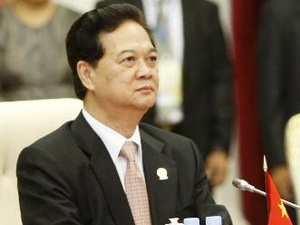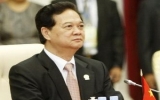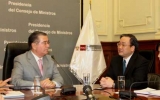PM Dung attends fourth Japan-Mekong Summit
Prime Minister Nguyen Tan Dung attended the fourth Japan-Mekong Summit, which took place in Tokyo on April 21, under the chair of Japanese PM Yoshihiko Noda.
On addressing the event, PM Dung confirmed Vietnam ’s support for Mekong-Japan Cooperation and the role it plays in the prosperity, stability and development of the Mekong region and East Asia in general.

Prime Minister Nguyen Tan Dung
Dung underlined the priorities given to specific activities, including coping with floods, natural disasters and salinity levels in the region, ensuring food security and seeking long-term solutions for sustainably using the Mekong Rivers water resources.Top priority should be given to research and assessing the impacts of the exploitation of the Mekong Rivers water on the environment and its water resources, he said.
PM Dung also proposed an initiative to develop an integrated transport network to increase connectivity between the economic corridors in the Mekong sub-region.
The summit reviewed the implementation of the Mekong-Japan cooperation programme for the period 2010-2012 and the adopted the Tokyo Strategy. It defined three priority tasks, including, enhancing connectivity in the Mekong region, promoting trade and investment and co-operation on environmental issues and public security.
The leaders reached a consensus on research for the sustainable management and development of the Mekong Rivers water, including the impact of hydro-power dams.
At the conference, Japan pledged ODA provision of 600 billion JPY to the Mekong countries for the period 2013-2015 while Thailand pledged 883 million JPY.
The Tokyo strategy confirmed its members’ stance on the region’s political and security issues such as the Korean peninsula, non proliferation of nuclear and other weapons of mass destruction and UN reforms.
In the strategy, the Mekong countries and Japan, emphasised that maintaining peace, stability, maritime safety and freedom in the East Sea is a common aspiration and in the interests of countries both in and outside the region.
They said that all concerned parties should settle the East Sea dispute by peaceful means with a spirit of mutual understanding and respect, and obey international law, especially the 1982 UN Convention on the Law of the Sea and the Declaration on the Conduct of Parties in the East Sea as well as creating a Code of Conduct for the East Sea (COC).
The summit assigned their ministers to come up with a new action programme for the 2012-2015 to implement the Tokyo Strategy and agreed to hold the next summit in 2013.
On addressing the press conference at the end of the summit, PM Dung highlighted Japan’s commitments to the Mekong region and its assistance as the country is still overcoming the consequences of its recent earthquakes and tsunami.-
VNA



